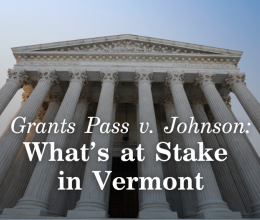
Vermont is overpoliced, and more so every year. That statement may be surprising or even jarring to some, but it is based on a growing body of data collected by Vermont police themselves.
UVM Professor Stephanie Seguino along with Professor Nancy Brooks and data analyst Pat Autilio have reviewed that data, and their findings are alarming.
Specifically, Vermont drivers are subjected to a large and growing number of traffic stops – at a rate far above the national average. From 2015 to 2019, police in Vermont stopped motorists at nearly three times the national average – 255 drivers stopped per 1,000 residents, compared to 86 drivers per 1,000 residents nationally.
There is of course wide variation between police departments. Bennington police, for example, stop motorists at a rate that is more than seven times the national average. But the picture that emerges shows Vermont police stopping drivers at alarmingly high rates statewide – and the data show that this problem is only getting worse over time.
For example, stops by Vermont sheriff’s departments increased by a whopping 86 percent from 2015 to 2019, while stops by Vermont State Police increased nearly 50 percent. Overall, Vermont law enforcement made 174,000 traffic stops in 2019 –a 40 percent increase from 2015.
The authors leave open the question of why Vermont police have become so aggressive despite the fact that Vermont is one of the safest states in the country and crime remains at historic lows. It is a question that warrants further inquiry by local and state leaders.
Financial and career incentives likely play a part, but the study’s other findings suggest other factors may be at play. Specifically, police across the state continue to stop, search, and ticket Black and Brown drivers at higher rates than white drivers, even though they are less likely to be found with contraband. These findings are by now all too familiar: studies of Vermont police data released in 2016, 2017, 2018, and 2020 all reached similar conclusions.
Unfortunately, as in years past, law enforcement officials continue to deny or downplay the extent of racial profiling in Vermont. As reported by VTDigger, “Police chiefs say they still need more information before drawing conclusions from the data.”
But make no mistake—this latest study again confirms that while Vermont may be overpoliced, Black and Brown Vermonters are aggressively overpoliced.
Discriminatory traffic enforcement is just one example of law enforcement overreach and abuse of power, but this report is further evidence that Vermont needs to fundamentally change its approach to policing, including downsizing the footprint and broad authority of police in our communities.
Because these encounters are not merely data points – they represent people with real lives who are impacted negatively and even endangered by overpolicing.
Take the case of ACLU client Gregory Bombard, for example. In 2018, a state trooper stopped Bombard in St. Albans – not for a traffic violation, but because he believed Bombard had given him “the finger,” a perfectly legal act. The trooper ended up arresting Bombard for disorderly conduct.
Bombard’s car was towed, he was briefly jailed, his name and VSP’s version of events were shared with the press, and it was almost a year before the charge was finally dismissed. He is now suing for violation of his rights.
As bad as all this was, we can’t ignore the likelihood that had he been a Black man Gregory Bombard would have been treated even worse. Still, his experience is yet another example of the many ways in which Vermonters are overpoliced.
That’s why the ACLU and a broad coalition of partners are calling on lawmakers to enact a ten-part action plan to reimagine and transform policing in Vermont. The plan includes recommendations for preventing unnecessary police interactions, like the one experienced by Gregory Bombard and so many other Vermonters. It also means limiting the broad powers of law enforcement – including police discretion to arrest people for petty offenses like “disorderly conduct,” authority to conduct “consent”-based searches, and involvement in mental health crises.
Clearly, systemic discrimination and a dramatic increase in police stops calls for further investigation, oversight, and accountability. But one of the best and most direct ways we change the status quo in Vermont is to place stronger limits on the many overbroad powers we have ceded to our law enforcement agencies.
*A version of the post was published as an opinion editiorial by ACLU-VT Executive Director James Duff Lyall in VT Digger on 02/14/2021.

